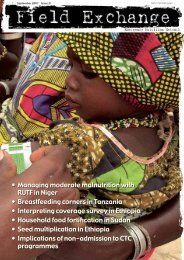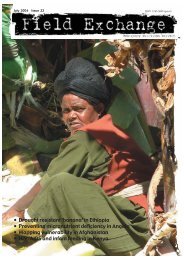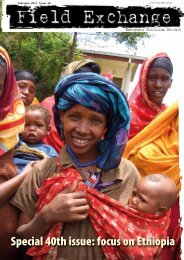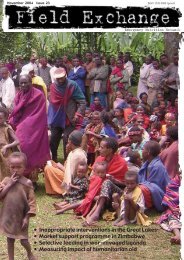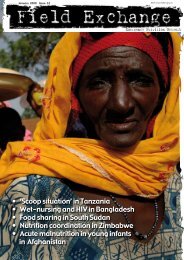Download a PDF of this issue - Field Exchange - Emergency ...
Download a PDF of this issue - Field Exchange - Emergency ...
Download a PDF of this issue - Field Exchange - Emergency ...
You also want an ePaper? Increase the reach of your titles
YUMPU automatically turns print PDFs into web optimized ePapers that Google loves.
<strong>Field</strong> Article<br />
there were external factors beyond the control <strong>of</strong><br />
the programme managers despite their efforts to<br />
contain them. These factors included the regularity<br />
<strong>of</strong> mothers at the twice-weekly cooking<br />
demonstration sessions, quality and quantity <strong>of</strong><br />
food which they gave to their children inbetween<br />
the twice-weekly visits to the health<br />
facilities and episodes <strong>of</strong> illness like malaria,<br />
diarrhoea or respiratory tract infections. Efforts<br />
to contain these external factors included:<br />
• Home visits for defaulting mothers by CHWs<br />
• Support to mothers <strong>of</strong> children during an<br />
episode <strong>of</strong> illness<br />
• Distribution <strong>of</strong> premixes (CSB, oil, sugar<br />
and salt) to mothers <strong>of</strong> MAM children after<br />
each weekly cooking demonstration in the<br />
health facility when available.<br />
The role <strong>of</strong> mothers in the management <strong>of</strong><br />
moderate acute malnutrition<br />
The compliance <strong>of</strong> mothers to advice on the<br />
preparation <strong>of</strong> enriched porridge, feeding practices<br />
at home and their attendance record at the<br />
twice-weekly food preparation demonstrations<br />
played an important role in the favourable exit<br />
outcome <strong>of</strong> moderate acute malnutrition. Despite<br />
the challenges <strong>of</strong> increases in the prices <strong>of</strong> basic<br />
foodstuffs, many mothers were able to mobilise<br />
resources to purchase ingredients and prepare<br />
enriched porridge for their children irrespective<br />
<strong>of</strong> supplies <strong>of</strong> premix via the programme.<br />
Conclusions<br />
Government health facilities when given the<br />
appropriate technical, material and equipment<br />
support can deliver good results in the management<br />
<strong>of</strong> MAM cases. On the job training and<br />
supervision, feedback on performance and<br />
regular higher level supervision <strong>of</strong> nutrition<br />
activities played an important role in the quality<br />
<strong>of</strong> results posted by the four health facilities<br />
that were considered in <strong>this</strong> study.<br />
To many mothers, MAM is not an illness and<br />
compliance with treatment, particularly when it<br />
requires weekly presence in a health facility, is a<br />
challenge. The multi-pronged approach <strong>of</strong><br />
community sensitisation, information and<br />
education, home visits and facility-based<br />
management <strong>of</strong> MAM children through weekly<br />
weighing and cooking demonstration adopted<br />
by Fondation Tdh and the authorities <strong>of</strong> the<br />
health facilities <strong>of</strong> the project, improved the<br />
knowledge <strong>of</strong> mothers about acute malnutrition<br />
in general, and MAM in particular.<br />
Cooking demonstrations that included feeding<br />
MAM children in health facilities and<br />
education and counselling on good household<br />
infant and young feeding practices were acceptable<br />
services to mothers. Compliance with<br />
treatment and the recovery rate was high and<br />
the rate <strong>of</strong> default was low. Lack <strong>of</strong> knowledge<br />
amongst mothers on appropriate feeding practices<br />
is likely to have been a significant factor in<br />
causing malnutrition in those children admitted<br />
to the MAM programme.<br />
The role <strong>of</strong> UCHWs is pertinent even where<br />
there is a wide network <strong>of</strong> private and public<br />
health facilities. Through the active screening <strong>of</strong><br />
children in their homes in the quarters, many<br />
children who otherwise would not have been<br />
brought to the health facility because they were<br />
not perceived as being ill by their mothers,<br />
were identified and sent to the health facility for<br />
treatment for MAM.<br />
Finally the management <strong>of</strong> MAM in an urban<br />
setting demands a multi-pronged approach that<br />
involves trained health workers, community<br />
health workers, information education and<br />
counselling <strong>of</strong> mothers, good supervision and an<br />
adequate level <strong>of</strong> food security.<br />
For more information, contact: Dr. Abimbola<br />
Lagunju, email: abimbola.lagunju@tdh.ch<br />
and Dr. Jean Pierre Papart,<br />
email: jeanpierre.papart@tdh.ch<br />
Dedication to Kari Noel Egge<br />
Shared by two <strong>of</strong> her close friends and<br />
colleagues, Mary Lung’aho and Jennifer<br />
Rosenzweig<br />
As we went to print, we heard the sad<br />
news <strong>of</strong> the premature death <strong>of</strong> Kari<br />
Egge, whom many <strong>of</strong> you will have had<br />
the privilege <strong>of</strong> knowing and working with.<br />
Kari graduated from Mahtomedi High<br />
School in 1985 and George Washington<br />
University in 1989. Kari earned a PhD in Public<br />
Health from Tulane University where she<br />
combined studies with HIV/AIDS- related projects.<br />
In the following years, Kari dedicated<br />
herself to international causes. Her career in<br />
humanitarian aid work spanned over 20 years<br />
with Peace Corps, Catholic Relief Services (CRS)<br />
and the International Division <strong>of</strong> American Red<br />
Cross (AmRC). As part <strong>of</strong> CRS’ <strong>Emergency</strong><br />
Response Team, she played a key role in numerous<br />
emergencies, including the Goma volcano<br />
disaster, Afghanistan, Southern Africa drought<br />
and the tsunami in Indonesia. In addition, Kari<br />
helped train hundreds <strong>of</strong> emergency responders.<br />
Her last posting was to Thailand, working<br />
with those in countries affected by the 2004<br />
tsunami. During her career, she made lasting<br />
friendships around the world. Kari was also a<br />
loving mother to Dylan (6) and Isabelle (8),<br />
taking every opportunity to introduce them to<br />
new cultures and environments.<br />
There has been a huge outpouring <strong>of</strong> tributes<br />
on Facebook from a global community <strong>of</strong><br />
colleagues and friends who supported her<br />
through her illness and are now celebrating her<br />
life. Here are just a few:<br />
“Kari will be greatly missed. Her enthusiasm and<br />
passion for improving the humanitarian cause<br />
will continue to inspire all <strong>of</strong> those who the pleasure<br />
to work with her.”<br />
“She was articulate, strong, and sensible and<br />
clearly had the experience to back up all the<br />
contributions she made”.<br />
“A mom who managed to become an amazing<br />
mother and still contribute to the humanitarian<br />
field for a long time. This affected me pr<strong>of</strong>oundly<br />
and I know I made decisions differently because <strong>of</strong><br />
her example. It is amazing how much impact<br />
Kari’s life had, not just on her immediate family<br />
who were blessed by her love and mourn her<br />
departure, but also on those <strong>of</strong> us who were<br />
merely in her presence and felt changed by her life<br />
and the way she chose to live it.”<br />
Some lovely memories are also shared at<br />
http://thegeography<strong>of</strong>soul.wordpress.com/201<br />
2/01/31/kari-noel-egge/<br />
There will be gatherings for her and celebrations<br />
<strong>of</strong> her life happening around the world<br />
(Minnesota, Washington DC, Kenya and<br />
Bangkok). This speaks to the incredible impact<br />
that she has had on the world.<br />
We express our sincere condolences to her<br />
children, Dylan and Isabelle, on their loss, as<br />
well as to their father, Graham Eastmond, her<br />
parents, Robert and Deanna Egge, brother Kirk<br />
and family.<br />
Mary Lung’aho, Jennifer Rosenzweig<br />
and all <strong>of</strong> the ENN Team<br />
Dedication to Mr Abdikarim<br />
Hashi Kadiye<br />
Shared by Leo Matunga, Nutrition Cluster<br />
Coordinator, Somalia<br />
We extend condolences to the family<br />
and friends <strong>of</strong> Mr Abdikarim Hashi<br />
Kadiye and Mr Duale, who died on the<br />
12th <strong>of</strong> January 2011 in Somalia. Mr Kadiye the<br />
head <strong>of</strong> T<strong>of</strong>iiq Umbrella Development organisations<br />
(TUOS) and also, the nutrition cluster focal<br />
point for Hiran and Galgaduud, had just<br />
recently organised and chaired the Hiran-<br />
Galgaduud cluster meeting on the 10th <strong>of</strong><br />
January 2011. Mr Kadiye was killed together<br />
with his driver, Mr Duale, in an ambush by<br />
unknown gunmen between Dhusamareb and<br />
El Dhere. This is a senseless loss <strong>of</strong> life and a<br />
huge loss to the work <strong>of</strong> the cluster in the<br />
region. Mr Kadiye had been the nutrition focal<br />
person for Galgaduud for almost a year now,<br />
was a hard working member <strong>of</strong> the cluster, and<br />
had tried under difficult conditions to continue<br />
to organise partners meetings in the area and<br />
ensure smooth operations <strong>of</strong> the nutrition<br />
programme.<br />
We extend our heartfelt condolences to Mr<br />
Kadiye and Mr Duale’s families, friends and the<br />
TUOS staff.<br />
Leo Matunga and the ENN Team<br />
68



